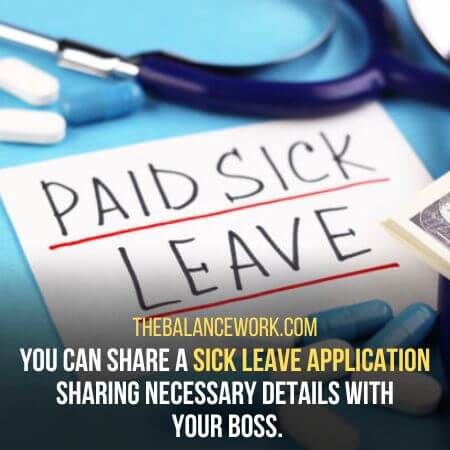Sickness is one of those things that can come on suddenly and without warning. When it does, the last thing you want to think about is do you need to tell your boss why you are sick.
The truth is, there are no hard and fast rules regarding details about your health.
Do You Need To Tell Your Boss Why You Are Sick – A Guide
Sick leave is a common occurrence in every workplace. Different companies have different policies.
But the bottom line is that you’re entitled to take time off to recover if you’re not feeling well.
When deciding how much information to share with your boss about why you are out sick, there are a few things to consider.
1. Severity Of Your Illness:
Do you need to tell your boss why you are sick if the illness is not severe?
If you have a cold or the flu, your boss will understand that you must take a sick day.

There is no need to go into details about your symptoms. And if you are comfortable, you can say that you are not feeling well and leave it at that.
The severity of the illness is essential. It determines how much detail you need to provide.
If you are dealing with a more severe health issue, you may need to provide your boss with more information.
2. Your Employer’s Policy:
Finding out your employer’s policy on sick leave is an excellent place to start.
Some companies require employees to provide a doctor’s note when they are out sick for more than a few days.
Others have more flexible policies and require employees to notify their supervisor that they will be out.
Ask HR or your boss if you are unsure of your company’s policy. They are usually the best sources of information on these matters.
3. The Reason For Your Absence:
The reason for your absence is also something to consider. You may want to keep that information private if you are out sick due to a mental health issue.
There is no shame in taking time off for your mental health. But you are not obligated to share that information with your employer.
The same goes for other personal health issues. You are not required to share details about your health with your boss unless you feel comfortable doing so.
4. Your Privacy:
Are you comfortable sharing details about your health with your boss?
Some people are more private than others when it comes to their health. And that’s okay.
You have the right to keep your medical information to yourself.
Your boss does not need to know why you are sick unless you want to tell them. And no employer can force you to share details about your health against your will.
However, they may require you to provide a doctor’s note if you are out for an extended period.
5. The Relationship With Your Boss:
Do you have a good relationship with your boss? If so, you may feel comfortable sharing more information with them.
If you are unsure how they will react, it may be best to keep the details to yourself.
Some bosses can be insensitive or even judgmental regarding employee health. If you are not comfortable with your boss, keeping the information to yourself is best.

You may share a close relationship with your boss. If so, you may feel more comfortable sharing information about your health.
The decision of how much to share is ultimately up to you.
6. The Impact Of Your Absence:
How will your absence impact your work? If you can work from home, you may not need to give your boss too many details.
But if your absences significantly impact your work, you must be upfront with your boss.
This way, they can make arrangements to ensure that your work is covered while you are out.
Sometimes, it is best to err on the side of caution. This way, you can avoid any potential awkwardness or conflict.
For instance, it may be best to tell your boss if you are dealing with a mental health issue. This way, they can be understanding and accommodating.
7. The Length Of Your Absence:
The length of your absence determines if you must tell your boss why you are sick.
If you are only taking a few days off, there is no need to provide any details about your health.
But if you are going to be out for an extended period, it is mandatory. As per general company policy, you can take up to 10 days off without a doctor’s note.
So, if you are planning on being out for more than ten days, it is best to provide your boss with a doctor’s note.
Make sure to follow your company’s policy on sick leave. This way, you can avoid any potential conflict or misunderstanding.
8. If It Is Terminal:
If your illness is terminal, you may want to tell your boss. This way, they can make arrangements for your absence.
They may also want to offer you support during this difficult time. They can provide you with information about employee assistance programs.
And this may be the best decision if you are planning on taking a lot of time off work.
9. Did Your Boss Ask?
If your boss asks why you are taking a sick day, you can choose to tell them or not.
It is ultimately up to you how much information you want to share.
You may want to be honest and tell them the truth. Or you may not feel comfortable sharing details about your health. But if your boss did not ask, there is no need to tell them.
In fact, why would you want to? Because, nothing good ever comes from snooping around in other people’s business.
10. When In Doubt, Play It Safe:
If you are unsure about whether or not to tell your boss why you are sick, it is best to play it safe.
You can share a leave application sharing necessary details. Such as the duration of your leave.

And share why you are taking leave without giving too many details about your health.
It is wonderful that you don’t feel comfortable sharing the details.
Your boss should respect your privacy. They should understand if you don’t want to share too much information.
Effects Of Telling Your Boss Why You Are Sick
There are positive and negative effects of telling your boss why you are sick. Let’s discuss both and see which one suits you better.
1. Transparency:
The biggest advantage of being transparent with your boss is building trust.
It shows that you are willing to share information about your health and have nothing to hide.
This can be beneficial in the long run. It will help to create a more open and understanding relationship with your boss.
2. Support:
Another advantage of telling your boss why you are sick is that they may be able to offer you support.
This is especially true if your illness is severe or terminal. Your boss can provide you with information about employee help programs.
3. Accountability:
If you are taking a lot of time off work, it is best to tell your boss why. This way, they can make arrangements for your absence.
And meanwhile, you can focus on getting better without worrying about work.

This shows your accountability and commitment to your job. It will be appreciated by your boss.
4. Avoidance Of Conflict:
Conflicts arise when there is miscommunication. If you are clear about why you are taking leave, there will be no scope for misunderstanding.
Your boss will know exactly what to expect, and there will be no surprises. This can help to avoid any potential conflict or misunderstanding.
And even other employees will not speculate about your health.
Negative Effects:
There are also some adverse effects of telling your boss why you are sick.
The first is that it may create a feeling of awkwardness between you and your boss.
You may also feel like you are being treated differently because of your illness.
It may affect your future job prospects if your boss shares this information with others.
So, these are some things to consider before telling your boss why you are sick.
Effects Of Not Telling Your Boss Why You Are Sick
There are also advantages to not telling your boss why you are sick. These advantages may outweigh the disadvantages we discussed earlier.
You can decide what information to share when you don’t tell your boss why you are sick.
This means you can choose to share as much or as little information as you want.
You are in control of the situation and can share only what you feel comfortable sharing.
2. It Is None Of Their Business:
It is none of your boss’s business why you are sick. They don’t need to know every little detail about your health.

All they need to know is that you are taking leave and for how long. Telling them anything beyond that is not necessary and is up to you.
3. Maintains Privacy:
Employees have a right to privacy. And you are maintaining that privacy by not telling your boss why you are sick.
Your health is personal information, and you are not obligated to share it with anyone unless you want to.
And when you exercise this right, you encourage others to do the same.
4. Avoid Uncomfortable Questions:
You may not want to answer uncomfortable questions about your health. Then don’t tell your boss why you are sick.
You can avoid any awkward or intrusive questions by not sharing this information.
And you will also not have to worry about your boss making assumptions about your health.
Final Word:
So do you need to tell your boss why you are sick? The answer is it depends.
There are advantages and disadvantages to both sharing and not sharing this information.
It is up to you to decide what is best for you and your situation. If you are comfortable sharing this information, then go ahead and tell your boss.
But you don’t have to share if you don’t want to share. It is entirely up to you unless the company’s strict policy.
Last Updated on 2 years ago by Shahzaib Arshad
- Why Does My Boss Wink At Me? 6 Potential Reasons - October 5, 2023
- Is It Legal For Your Employer To Call Your Doctor? No, But… - October 4, 2023
- 12 Ways To Deal With A Low IQ Person - September 22, 2023